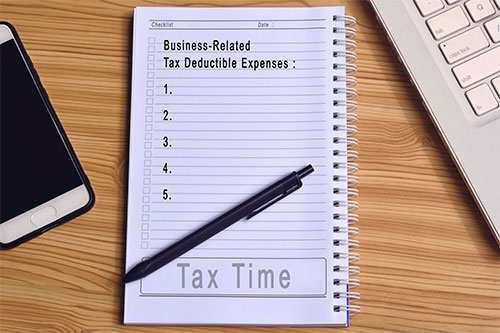20 Top Tax Write Offs for Self-Employed Income
Are you wondering if there are valuable tax write offs for self-employed individuals? It seems like every tax year there are more ways in which individual income is taxed. The one significant refuge for tax savings left for the individual is self-employment. Here are 20 tax write offs for self-employed income that apply to almost every self-employed individuali.
- Miscellaneous business expenses – Starting off with this one is good because it is important to know that even if an expense related to doing business isn’t in one of the 19 other categories of expense here, it is probably still one of many tax write-offs available for self-employed individuals.
- Bad Debts – If you invoice customers or clients, it is inevitable that you will run into non-payment problems. If you reach a point where a debt owed to your business for any reason is not going to get paid, you can write off the unpaid amount, partial or full, as a bad debt deduction.
- Retirement plans and employee benefits – If you fund education or other benefits for your employees, from childcare to contributions to retirement plans, you can deduct those payments as tax write offs for self-employed income.
- Business property mortgage interest – Real property owned by the business qualifies the business to deduct the mortgage interest as a business expense. Unlike a personal residence, there is no cap on the amount of the business mortgage interest deduction.
- Loss carryovers – Whenever there is a limitation on deductions, such as not being able to deduct certain expenses unless there is a profit, the losses that you were not able to deduct that tax year can be carried over into future tax years for tax write offs for self-employed business owners.
- Office expenses – All normal expenses incurred in the operation of an office for the business are deductible. This includes office supplies, furnishings, electronics, etc.
- Interest paid on business debt – Debt for the operation of the business qualifies the business for tax write offs for self-employed income. This includes credit cards, but to keep things simple and avoid IRS issues, the credit cards should be used solely for the business and not mix in personal purchases.
- Professional fees – Fees paid to attorneys, consultants, accountants, and other professionals are valid tax write offs for self-employed business owners.
- Meals – The cost of meals for business purposes are deductible at 50% of the amount spent. There are some special instances where the entire cost can be deducted but consult an accountant.
- Business insurance – The cost of property insurance, liability, malpractice, and other insurance purchased for the business are deductible tax write offs for self-employed income.
- Repairs – Repairs to business facilities or equipment are deductible as business expenses.
- Commissions or fees – Commissions paid to commissioned salespeople or referrals fees paid for business or customers delivered are deductible as tax write offs for self-employed people.
- Marketing and advertising – Generally, all expenses for marketing and advertising of the business and its products and services are deductible business expenses.
- Business property rent – If your business rents its location, facilities, or equipment used in the business, it is a deductible expense.
- Supplies – Supplies used in the operation of the business or those used in the production of products or delivery of services are deductible as business expenses. If you hold a significant stock of supplies from one tax year to another, consult with an accountant to see if you must consider it inventory instead of expended supplies.
- Salaries and wages – All salaries and wages paid to employees are deductible, including bonuses or special commissions. This would include a salary paid to the owner if properly structured.Owners’ wages in many cases are valid tax write offs for self-employed individuals.
- Contract labor – If you hire sub-contractors or freelancers, you can deduct the amounts you pay them as business expenses. Consult an accountant if necessary to make sure a freelancer will be considered as such by the IRS, rather than an employee for withholding.
- Depreciation – For some equipment and for purchased business real estate structures, you can depreciate the cost over an IRS-specified lifespan. You can deduct the annual portion of that depreciation amount in the tax year.
- Vehicle expenses – Cars and trucks used exclusively for the business will allow the business to deduct the expense of operating those vehicles. Fuel, repairs, purchase interest, etc. are included.
- Other taxes – Other taxes paid by the business are deductible, including local real estate taxes and the business share of withholding for Social Security and Medicare.
Tax write offs for self-employed individuals make owning a business a great income generator and tax reduction mechanism.
i Top Small Business Tax Deductions – SmallBizTrends.com
Phrase “tax write offs for self-employed” density at 1.4%

